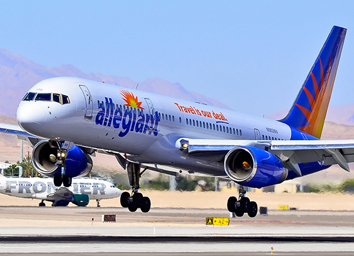Subscriber Benefit
As a subscriber you can listen to articles at work, in the car, or while you work out. Subscribe NowDirt-cheap fares are popping up from airlines brave enough to expand or start out amid the COVID-19 crisis as they try to eke out sales and get a jump on competitors that have pared back operations.
Airlines worldwide cut $1 billion of expenses a day last year to cope with the slump in passengers, and that’s given them some wiggle room to lower ticket prices. More broadly, cost savings are emerging for carriers as unwanted planes become available on the cheap. Thousands of laid off flight crew are also eager for work, allowing some airlines to go on hiring sprees.
Ultra-cheap fares could help revive the market by luring back customers who’ve been reluctant to fly due to border restrictions and lengthy quarantines. Vaccine rollouts add to the bullishness, even with air passenger travel in an unprecedented funk and a return to pre-crisis levels not expected before 2024.
Here’s a rundown of some of the latest industry moves.
Vacation travel
With the U.S. vaccination program gathering pace, Las Vegas-based Allegiant Travel Co. has embarked on the second-largest network expansion in its history.
Allegiant is adding 36 new nonstop routes from cities including Austin, San Diego, Indianapolis and Albany.
“There is a lot of pent-up demand for travel to cities that offer a gateway to great outdoor experiences,” said Drew Wells, Allegiant’s senior vice president of revenue. One-way fares on the new routes cost as little as $39.
Dallas-based Southwest Airlines Co. is conducting its biggest network expansion since 2013, starting or planning services at 17 airports including beach and mountain vacation destinations.
Southwest is also adding flights for the first time at the major airports in Houston, Chicago and Miami in a bid to win more business travelers.
Breeze Aviation Group Inc., a start-up airline planned by JetBlue founder David Neeleman, won tentative operating approval from U.S. authorities in February and aims to begin services this year. A second U.S. start-up, Avelo Airlines, formed by Allegiant co-founder Andrew Levy, plans to begin services in the first half.
As demand cratered last year, average U.S. domestic fares fell to $245 in the third quarter, the lowest on record, the Department of Transportation said in January. That was 30% down from the same quarter in 2019.
The prices reflect the carnage across the industry. Some 425,000 industry jobs have been lost, and commercial airline traffic remains 45% below pre-pandemic levels, according to data from FlightAware. Highly contagious COVID-19 mutations have dashed previous hopes of an imminent rebound.
Three’s a crowd
Little known outside Australia, Regional Express Holdings Ltd. has decided now is the time to go up against Qantas Airways Ltd. and Virgin Australia Airlines on one of the world’s busiest routes—Sydney-Melbourne. Backed by Asian private-equity firm PAG, Rex last week launched full-service flights between the cities on leased Boeing Co. 737s that include eight business-class seats. Tickets start at $62 one-way and the airline has said it will offer as many as nine return trips a day.
It’s a major step for Rex, which mostly operates smaller propeller planes. The company secured a “significant reduction” on normal rates on its 737s and aims to add flights to other Australian state capitals, according to Deputy Chairman John Sharp. “There’s never been a better time to set up a domestic airline operation in Australia,” he said.
Rex plans to hire 400 extra staff to run the new services, including 80 pilots.
For a trip from Melbourne to Sydney on June 10, Virgin Australia is matching Rex’s fares, while Qantas flights start at $109, according to their websites.
Doubling up
Canada’s Flair Airlines Ltd. is betting that pent-up demand to see friends and family will spur a domestic travel recovery in the Northern Hemisphere summer. The ultra-low-cost carrier is bulking up its fleet and almost doubling its network, with fares starting at $30.
Edmonton-based Flair is leasing 13 new Boeing 737 Max jets from one of its investors, 777 Partners, after the aircraft was cleared to fly again in January by Canada’s aviation regulator.
“Affordable air travel within Canada is the first step in restarting travel and tourism,” President Stephen Jones said last month.
All-you-can-fly deals
Crunched by border restrictions in Southeast Asia, low-cost airline AirAsia Group Bhd. is front loading its revenue recovery by selling $146 travel passes that allow unlimited flights in Malaysia and the Asean region for a year. The all-you-can-fly offer ran from March 3-7, and doesn’t include taxes, fees and other add-ons.
AirAsia doesn’t expect to start services to most of Southeast Asia before the third quarter, so the travel pass means it can book income months before costs are incurred. The airline can also control the number of flights available to pass holders, capping the overall redemption cost of the deal.
It’s a proven model. Last June, China Eastern Airlines Corp. was among Chinese carriers promoting unlimited weekend flights for the rest of the year for a single fee of $510.
Low-cost, long-haul
Deutsche Lufthansa AG expects cooped-up Germans will be overcome by wanderlust when lockdown finishes, and is starting a new airline to cater to them: Eurowings Discover, aimed at the low-cost, long-haul market.
Executives hope the carrier will enable Lufthansa to profit from a faster recovery in leisure flying as its core operations struggle due to a collapse in intercontinental corporate travel.
DZ Bank estimated Germans collectively saved around $466 billion last year. Looking to tap those savings, Eurowings Discover is offering flights from Frankfurt to Namibia or the Dominican Republic from around 600 euros return on Airbus SE A330 jets.
Please enable JavaScript to view this content.

